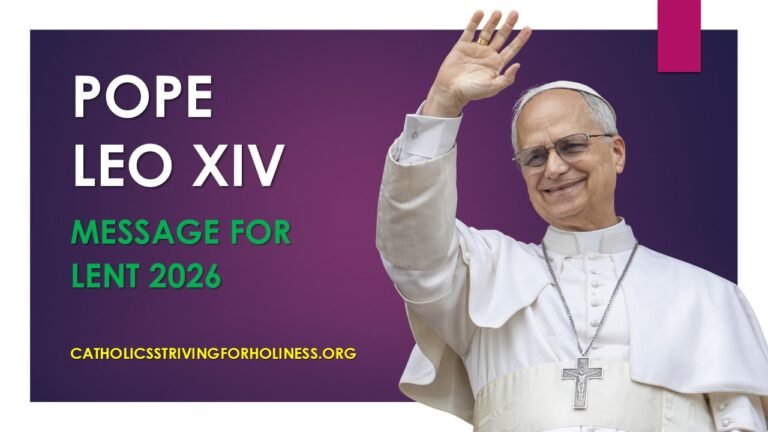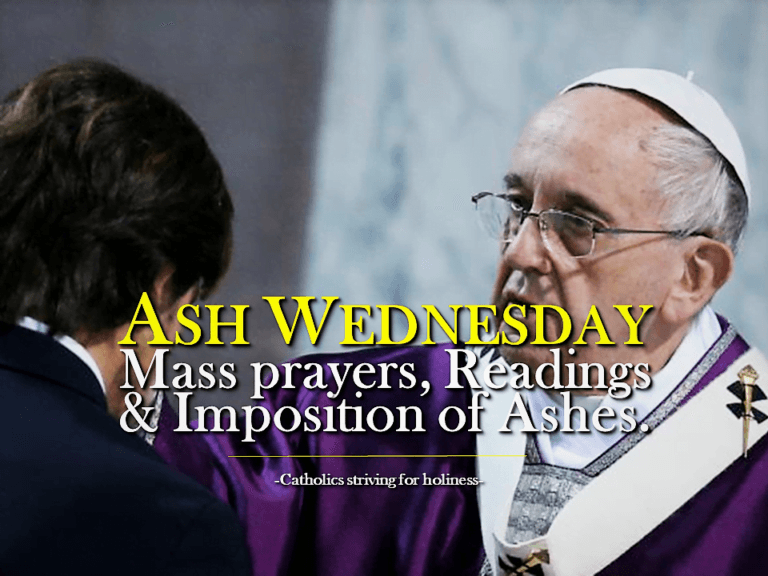POPE BENEDICT XVI ON ASH WEDNESDAY
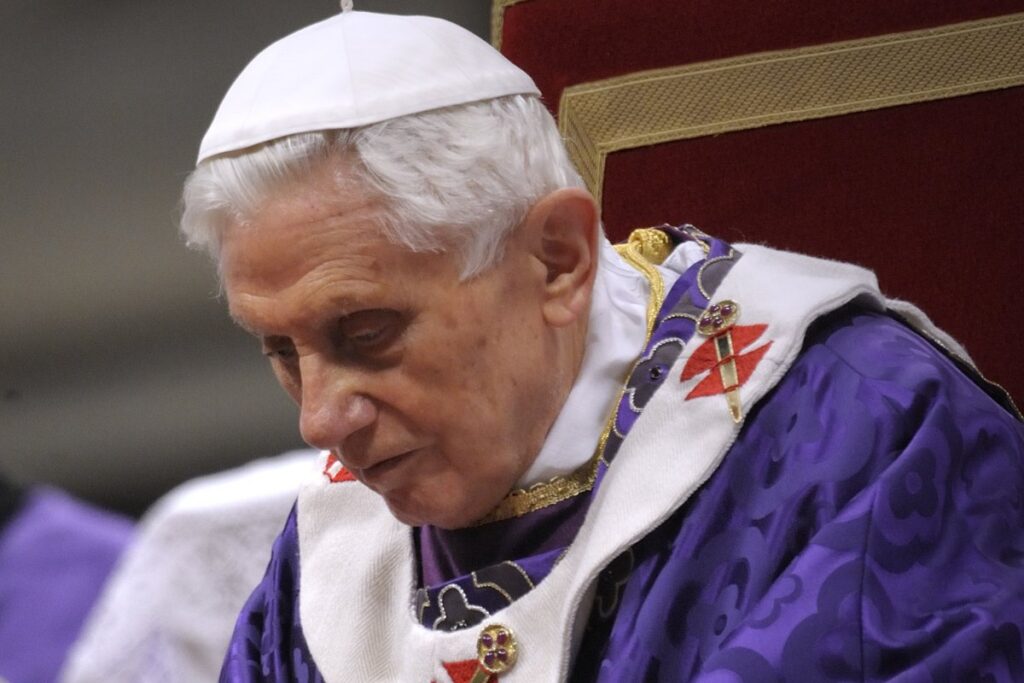
HIS HOLINESS POPE BENEDICT XVI on
Ash Wednesday, 1st March 2006
Your Eminences,
Venerable Brothers in the Episcopate and in the Priesthood,
Dear Brothers and Sisters,
The penitential procession with which we began today’s celebration has helped us enter the typical atmosphere of Lent, which is a personal and community pilgrimage of conversion and spiritual renewal.
According to the very ancient Roman tradition of Lenten stationes, during this season the faithful, together with the pilgrims, gather every day and make a stop – statio – at one of the many “memorials” of the Martyrs on which the Church of Rome is founded.
In the Basilicas where their relics are exposed, Holy Mass is celebrated, preceded by a procession during which the litanies of the Saints are sung. In this way, all those who bore witness to Christ with their blood are commemorated, and calling them to mind then becomes an incentive for each Christian to renew his or her own adherence to the Gospel.
These rites retain their value, despite the passing centuries, because they recall how important it also is in our day to accept Jesus’ words without compromises: “If any man would come after me, let him deny himself and take up his cross daily and follow me” (Lk 9: 23).
Another symbolic rite, an exclusive gesture proper to the first day of Lent, is the imposition of ashes. What is its most significant meaning?
It is certainly not merely ritualistic, but something very deep that touches our hearts. It makes us understand the timeliness of the Prophet Joel’s advice echoed in the First Reading, advice that still retains its salutary value for us: external gestures must always be matched by a sincere heart and consistent behaviour.
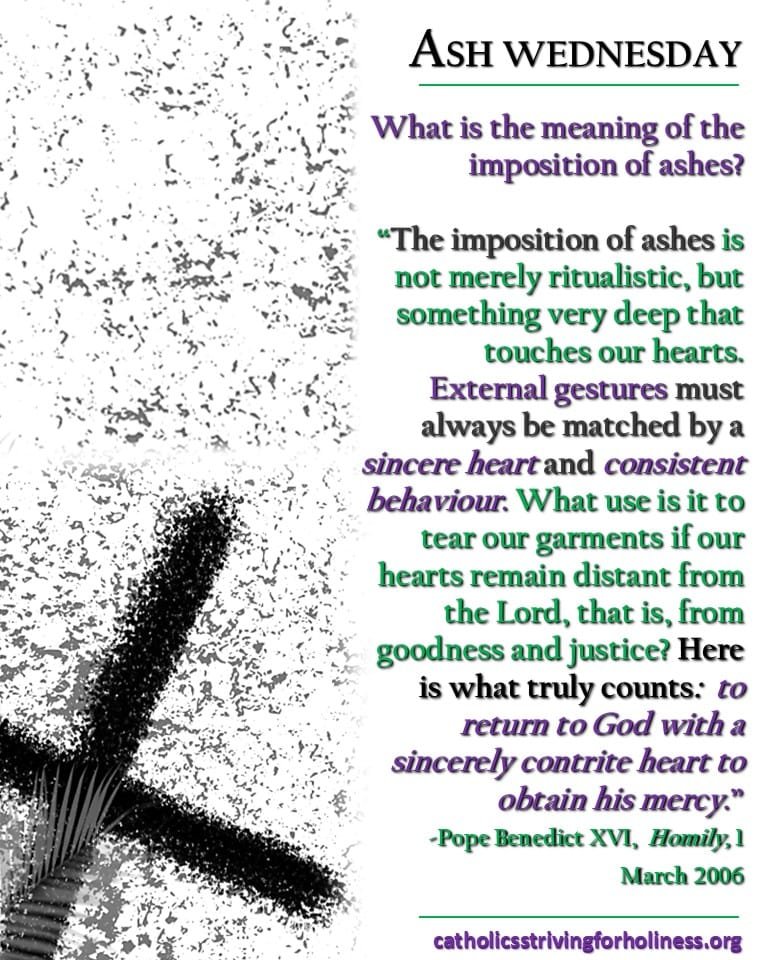
Indeed, the inspired author wonders, what use is it to tear our garments if our hearts remain distant from the Lord, that is, from goodness and justice? Here is what truly counts: to return to God with a sincerely contrite heart to obtain his mercy (cf. Jl 2: 12-18).
A new heart and a new spirit: we ask for this with the penitential Psalm par excellence, the Miserere, which we sing today with the response, “Be merciful, O Lord, for we have sinned” (The Sunday Missal).
The true believer, aware of being a sinner, aspires with his whole self – spirit, heart and body – to divine forgiveness, as to a new creation that can restore joy and hope to him (cf. Ps 51[50]: 3, 5, 12, 14).
Another aspect of Lenten spirituality is what we could describe as “combative“, as emerges in today’s “Collect”, where the “weapons” of penance and the “battle” against evil are mentioned.
Every day, but particularly in Lent, Christians must face a struggle, like the one that Christ underwent in the desert of Judea, where for 40 days he was tempted by the devil, and then in Gethsemane, when he rejected the most severe temptation, accepting the Father’s will to the very end.
It is a spiritual battle waged against sin and finally, against Satan. It is a struggle that involves the whole of the person and demands attentive and constant watchfulness.
St Augustine remarks that those who want to walk in the love of God and in his mercy cannot be content with ridding themselves of grave and mortal sins, but “should do the truth, also recognizing sins that are considered less grave…, and come to the light by doing worthy actions. Even less grave sins, if they are ignored, proliferate and produce death” (In Io. evang. 12, 13, 35).
Lent reminds us, therefore, that Christian life is a never-ending combat in which the “weapons” of prayer, fasting and penance are used. Fighting against evil, against every form of selfishness and hate, and dying to oneself to live in God is the ascetic journey that every disciple of Jesus is called to make with humility and patience, with generosity and perseverance.
Following the divine Teacher in docility makes Christians witnesses and apostles of peace. We might say that this inner attitude also helps us to highlight more clearly what response Christians should give to the violence that is threatening peace in the world.
It should certainly not be revenge, nor hatred nor even flight into a false spiritualism. The response of those who follow Christ is rather to take the path chosen by the One who, in the face of the evils of his time and of all times, embraced the Cross with determination, following the longer but more effective path of love.
Following in his footsteps and united to him, we must all strive to oppose evil with good, falsehood with truth and hatred with love.
In the Encyclical Deus Caritas Est, I wanted to present this love as the secret of our personal and ecclesial conversion. Referring to Paul’s words to the Corinthians, “the love of Christ urges us on” (II Cor 5: 14), I stressed that “the consciousness that, in Christ, God has given himself for us, even unto death, must inspire us to live no longer for ourselves but for him, and, with him, for others” (n. 33).
Furthermore, love, as Jesus says today in the Gospel, must be expressed in practical acts for our neighbour, and especially for the poor and the needy, always subordinating the value of “good works” to the sincerity of the relationship with our “Father who is in Heaven”, who “sees in secret” and “will reward” all whose good actions are humble and disinterested (cf. Mt 6: 1, 4, 6, 18).
The manifestation of love is one of the essential elements in the life of Christians who are encouraged by Jesus to be the light of the world, so that by seeing their “good works”, people give glory to God (cf. Mt 5: 16).
This recommendation to us is particularly appropriate at the beginning of Lent, so that we may understand better and better that “for the Church, charity is not a kind of welfare activity… but is a part of her nature, an indispensable expression of her very being” (Deus Caritas Est, n. 25).
True love is expressed in acts that exclude no one, after the example of the Good Samaritan who, with great openness of heart, helped a stranger in difficulty whom he had met “by chance” along the way (cf. Lk 10: 31).
Your Eminences, venerable Brothers in the Epsicopate and in the Priesthood, dear men and women religious and lay faithful, all of whom I greet with warm cordiality, may we enter the typical atmosphere of this liturgical period with these sentiments, allowing the Word of God to enlighten and guide us.
In Lent we will often hear re-echoing the invitation to convert and to believe in the Gospel, and we will be constantly encouraged to open our spirit to the power of divine grace. Let us cherish the abundance of teachings that the Church will be offering us in these weeks.
Enlivened by a strong commitment to prayer, determined to make a greater effort of penance, fasting and loving attention to our brethren, let us set out towards Easter accompanied by the Virgin Mary, Mother of the Church and model of every authentic disciple of Christ.
© Copyright 2006 – Libreria Editrice Vaticana
Source: https://www.vatican.va/content/benedict-xvi/en/homilies/2006/documents/hf_ben-xvi_hom_20060301_ash-wednesday.html
Emphasis mine.
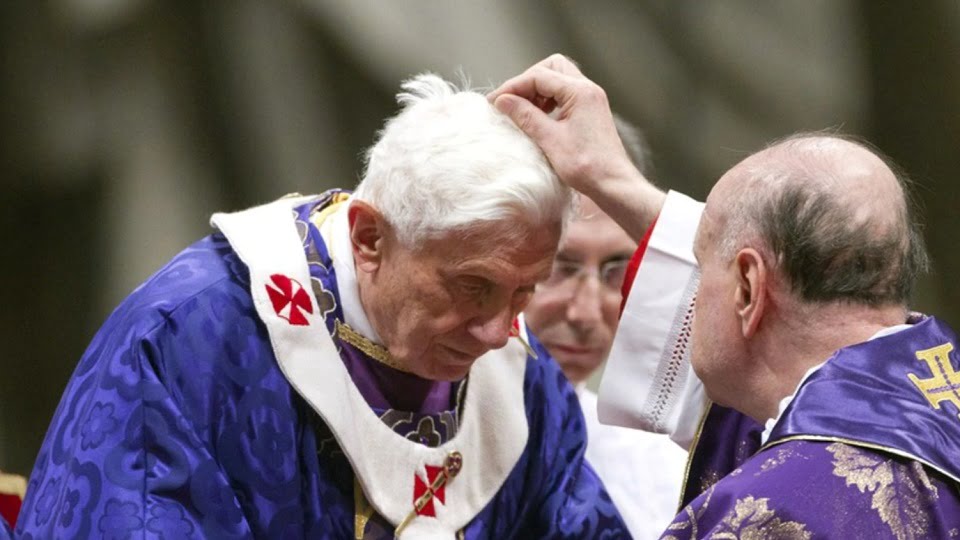
HIS HOLINESS POPE BENEDICT XVI on
Ash Wednesday, 17 February 2010
“Lord, you are merciful to all, and hate nothing you have created.
You overlook the sins of men to bring them to repentance.
You are the Lord our God” (Entrance Antiphon).
Venerable Brothers in the Episcopate,
Dear Brothers and Sisters,
With this moving invocation from the Book of Wisdom (cf. 11: 23-26), the Liturgy opens the Eucharistic Celebration of Ash Wednesday. In a certain way, these words introduce the entire Lenten journey; they establish the omnipotence of God’s love as the basis, his absolute dominion over every creature which is expressed in infinite forgiveness and animated by the constant, universal desire for life. Indeed, forgiving someone is equivalent to telling him or her: I do not want you to die, but to live; I always and only want the best for you.
This absolute certainty sustained Jesus during the 40 days he spent in the Judean desert, after he had received Baptism from John in the Jordan. For him that long period of silence and fasting was a complete abandonment of himself to the Father and to his plan of love. The time was a “baptism” in itself, that is, an “immersion” in God’s will and in this sense a foretaste of the Passion and of the Cross. Going out into the desert alone to remain there at length meant exposing himself willingly to the assaults of the enemy, the tempter who brought about Adam’s fall and whose envy caused death to enter the world (cf. Wis 2: 24). It meant engaging in battle with him, with nothing but the weapon of boundless faith to challenge him, in the omnipotent love of the Father. Your love is enough for me, my food is to do your will (cf. Jn 4: 34): this conviction pervaded Jesus’ mind and heart during his time of “Lent”. It was neither an act of pride nor a titanic undertaking but rather a humble choice, consistent with the Incarnation and the Baptism in the Jordan, in the same vein of obedience to the merciful love of the Father, who “so loved the world that he gave his only Son” (Jn 3: 16).
Our Lord Jesus did all this for us. He did it to save us, and at the same time to show us the path on which to follow him. Salvation is in fact a gift; it is the grace of God, but in order for it to make an impact on my life it requires my assent, an acceptance that is demonstrated in my actions in other words, the will to live like Jesus, to follow him. Following Jesus into the Lenten desert is therefore a prerequisite for participating in his Pasch, in his “exodus”. Adam was banished from the earthly Paradise, a symbol of communion with God. Now, in order to return to this communion and thus to true life, to eternal life, it is necessary to cross the desert, the trial of faith not alone, but with Jesus! He has preceded us, as always, and has already won the battle against the spirit of evil. This is the meaning of Lent, the liturgical Season that every year invites us to renew our decision to follow Christ on the path of humility, in order to take part in his victory over sin and death.
In this perspective one can also understand the penitential symbol of the ashes, which are placed upon the heads of all those who begin the Lenten journey with good will. It is essentially an act of humility that means: I recognize myself for what I am, a frail creature, made from earth and destined to return to earth, yet also made in the image of God and destined for him. I am dust, yes, but also beloved, shaped by his love, animated by his vital breath, able to recognize his voice and respond to him. I am free and therefore capable of disobeying him, of giving in to the temptation of pride and self-sufficiency. This is sin, the deadly illness that came so soon to pollute the blessed earth that is the human being. Created in the image of the Holy and the Just, man lost his own innocence. Now he can only return to being just by the grace of God’s justice, the justice of love that, as St Paul writes, “has been manifested… through faith in Jesus Christ” (cf. Rom 3: 21-22). These words of the Apostle provided an inspiration for the Message I addressed to all the faithful for this Lent, which is a reflection on the theme of justice in the light of the Sacred Scriptures and their fulfilment in Christ.
The theme of justice is also very present in Ash Wednesday’s biblical readings. First, the passage from the prophet Joel and the Responsorial Psalm the Miserere form a penitential diptych. This highlights what the Bible calls “iniquity” that is, sin, which fundamentally consists in disobeying God, which means a lack of love as the origin of every material and social injustice. “For I know my transgressions”, the Psalmist confesses, “and my sin is ever before me. / Against you, you only, have I sinned, / and done that which is evil in your sight” (Ps 51[50]: 3-4 [rsv]). The first act of justice is therefore recognizing one’s own iniquity and realizing that it is rooted in the “heart”, at the very core of the human person. The “fasting”, “weeping” and “mourning” (cf. Jl 2: 12), and any other expression of penitence only have value in God’s eyes if they are signs of sincerely repentant hearts.
The Gospel, too, taken from the “Sermon on the Mount”, insists on the need to practice one’s own “justice” almsgiving, prayer, fasting so that it may not be seen by men but only by the eyes of God, who “sees in secret” (cf. Mt 6: 1-6, 16-18). The true “reward” is not the admiration of others but rather friendship with God and the grace that derives from it, a grace that gives peace and strength to do good, to love even those who are not worthy, to forgive those who have offended us.
The Second Reading, Paul’s appeal to be reconciled to God (cf. 2 Cor 5: 20), contains one of the celebrated Pauline paradoxes, which leads to the whole reflection on justice in the mystery of Christ. St Paul writes, “For our sake he made him to be sin who knew no sin” that is, his Son made Man “so that in him we might become the righteousness of God” (2 Cor 5: 21). In Christ’s heart, in other words at the core of his divine and human Person, the entire drama of freedom was played out in decisive and definitive terms. God took his own plan of salvation to extreme consequences, remaining faithful in his love even at the price of sending his only Son to death, to death on the Cross. As I wrote in my Lenten Message, “Here we discover divine justice, which is so profoundly different from its human counterpart…. Thanks to Christ’s action, we may enter into the “greatest’ justice, which is that of love (cf. Rom 13: 8-10)”.
Dear brothers and sisters, Lent broadens our horizons; it orients us to eternal life. On this earth we are on a pilgrimage: “Here we have no lasting city, but we seek the city which is to come”, according to the Letter to the Hebrews (Heb 13: 14). Lent shows us the relativity of the goods of this earth, thus rendering us capable of the necessary sacrifices and free to do good. Let us open our world to the light of Heaven, to the presence of God among us. Amen.
© Copyright 2010 – Libreria Editrice Vaticana
Source: https://www.vatican.va/content/benedict-xvi/en/homilies/2010/documents/hf_ben-xvi_hom_20100217_ceneri.html
Emphasis mine.
Stay updated: subscribe by email for free TO OUR NEW WEBSITE www.catholicsstrivingforholiness.org (PUT YOUR EMAIL IN THE SUBSCRIBE WIDGET).
We are also in www.fb.com/Catholicsstrivingforholiness. Kindly help more people in their Christian life by liking our page and inviting your family, friends and relatives to do so as well. Thanks in advance and God bless you and your loved ones! Fr. Rolly Arjonillo
